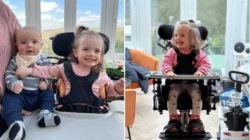Isla Duffy and brother Leo (Picture: SWNS)
Little Isla Duffy was left unable to verbally communicate and with extremely limited mobility after being deprived of oxygen at birth.
The two-year-old suffered a seizure shortly after she was born in January 2021 and was diagnosed with cerebral palsy.
While there’s no cure, thanks to blood from her six-month-old baby brother Leo’s umbilical cord, Isla could be about to take her first steps.
The tot will travel to Duke University Hospital, North Carolina, US, in August to undergo treatment using blood from the cord, which is rich with stem cells.
These cells are basically the body’s building blocks, and can be used to treat certain cancers, immune deficiencies and genetic disorders.
It’s hoped this treatment could help Isla too, with pioneering research in America having found some promising results.
Now, Isla’s parents, both 32, are hoping to raise £25,000 for the treatment and the physiotherapy that must come after.
Isla’s mum and dad, Emily, a project manager for a law firm, and Sim, a finance broker, were thrilled to learn that their daughter qualified for the treatment.
Isla Duffy, her mum Emily and dad Sim, along with her 6-month-old brother Leo (SWNS)
Emily, from Stockport, Greater Manchester, said: ‘It was a massive relief finding out that Isla qualified. You need at least 50% genetic compatibility – and we were lucky to be told Leo was a good enough match.
‘When you have a child that has cerebral palsy you’re told there’s no treatment or cure – so I guess I have high aspirations about the treatment now that there is finally something we can do.
‘A successful treatment could allow her to develop exponentially quickly. She might never have been able to talk, but if the treatment goes well there’s a chance she could.
‘She also might be able to learn to walk much faster. Currently, Isla can’t sit independently, crawl or walk.
‘Cerebral palsy limits her a lot. She is also nonverbal and has suspected autism, which makes communication with a very frustrated little girl extremely hard.
‘She loves books, especially sensory books, and loves to play outside. She really loves stroking animals like dogs and playing in the water too. She just wants to be able to do what other two-year-olds can do.
‘Hopefully, the treatment will give her a fresh lease of life, even just little things like being able to play with other kids and Leo.
‘At first she was not that interested in Leo, but as he’s got older the two of them have started playing with the same toys and flipping pages of books they are reading together.
‘It’s been lovely seeing them grow closer, and hopefully, the treatment will help with that too.’
The siblings (Picture: Emily Duffy / SWNS)
Sim and Emily are hoping to make the trip in two months’ time, so their daughter can have the $15,000 (£12,013) self-funded treatment.
‘At the moment there is no cure for cerebral palsy at all,’ said Sim. ‘But it is the most common motor disability in children affecting one in 400 in the UK.
‘It is also one of many conditions under clinical trials attempting to treat it. It’s a very difficult and long process though – it’s taken us six months and a lot of luck to qualify.
‘The UK is miles behind other countries on stem cell studies, but there are now other universities and hospitals that operate globally that now offer trial treatments.
‘But in the US they’re very strict about matches – the blood type has to be compatible and the genetic match between the donor and patient has to be close.
‘We had that in mind when we decided to have another child, and so when Leo was born in November, we made sure to save his cord blood.
‘Stem cells have really regenerative properties – you fire them into a child’s body, and you hope they replace, fix and rejuvenate cells in her body.
‘The best part is it is not even a scary or extensive surgery, it’s just administered via an IV drip into the bloodstream, and it only takes 20 minutes.
‘The effects can be amazing. In Duke University’s case, every child has had increased gains in movement after treatment, and there are reports of children in Australia who have even been able to walk or talk.’
The hopeful parents wanted to urge others in situations like theirs to do what they’ve done and save the umbilical blood from the births of any future children they might have – just in case they may need it in the future.
Sim added: ‘We’ve had around 60 to 70 families get in touch about the treatment since, and have raised over £9,000.
‘I think it’s because Isla is just so happy, she has such an amazing smile.
‘I really want to urge all parents to freeze their child’s cord blood, it might save you from dementia, Parkinson’s or even cancer.
‘I think we’ll be surprised in the future how useful it might be. We want the treatment to be offered in the UK, but we’re way off.’
If you want to help support Isla’s treatment, you can donate to her parents’ Just Giving page.
Do you have a story to share?
Get in touch by emailing [email protected].
MORE : Mum gives birth to ‘miracle’ baby after having her ovaries removed for life-saving cancer treatment
MORE : We were told our son had cerebral palsy – instead it was a rare and life-threatening disease
‘The effects can be amazing.’





